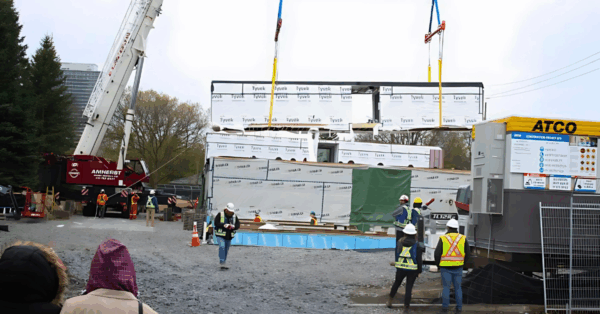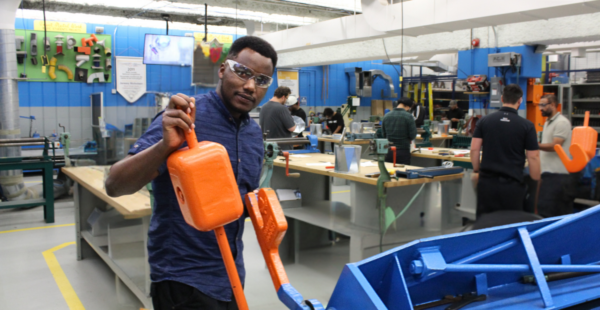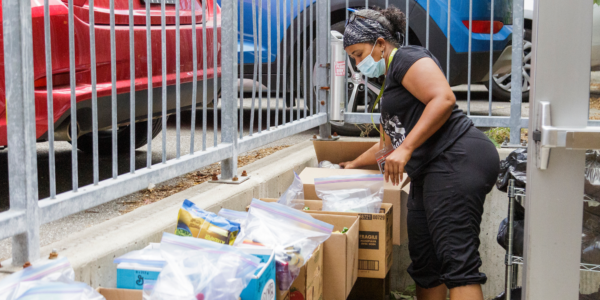She remembers opening the door to a bedroom filled with stuffies, seeing her mom smile and feeling that this place called ‘Homeward Bound’ would change things forever.
“That is a big moment for a little kid,” says Nawal Arshi, who was just four years old when she and her mother stepped into their new Toronto apartment owned by WoodGreen Community Services.
Nawal had never had a bedroom. She’d known homeless shelters, cramped temporary housing and dilapidated buildings where she’d been trapped in a broken-down elevator. Still, Nawal says, even that was better than life with the abusive father from whom she’d fled as a toddler, gripping tightly to her young mother’s hand.
That first day at Homeward Bound in 2004 marked the end of a life of violence, poverty, and insecurity for one mother and her child. It also marked the beginning of a transformative program that, over the next two decades, would bring generational change for hundreds of single mothers (and their children) facing homelessness.

Finding a Better Way Forward
The same year Nawal was born, 1999, so too was the idea for Homeward Bound. It was a response to a groundbreaking report on homelessness in Toronto, known as the Anne Golden report, released by the Mayor’s Homelessness Action Task Force.
The report painted a grim portrait of homelessness in Canada’s largest city, revealing families with children as the fastest-growing homeless population.
Anne Babcock, President and CEO of WoodGreen Community Services, vowed to change that. She had seen enough failed social programs to know success could only come from real, sustainable solutions. She knew WoodGreen could find a better way forward.
“We went out to shelters to talk directly to women,” she says. “We wanted to find out how they ended up there, and what would help them leave the shelter forever.”
The women told her that homelessness wasn’t just about housing. While housing was essential, it wasn’t enough to change their lives long term. There were other factors keeping them (and their children) in shelters or on the streets:
Landlords for permanent housing demand a stable income. That requires a job capable of sustaining a family, necessitating education and skills. Few of the women had completed high school and even fewer had any post-secondary education or training. Coming up with the money for post-secondary tuition seemed impossible. Moreover, who would care for their children while they were in school. Daycare was often out of their financial reach.
It was a vicious cycle that Babcock and WoodGreen were determined to break.
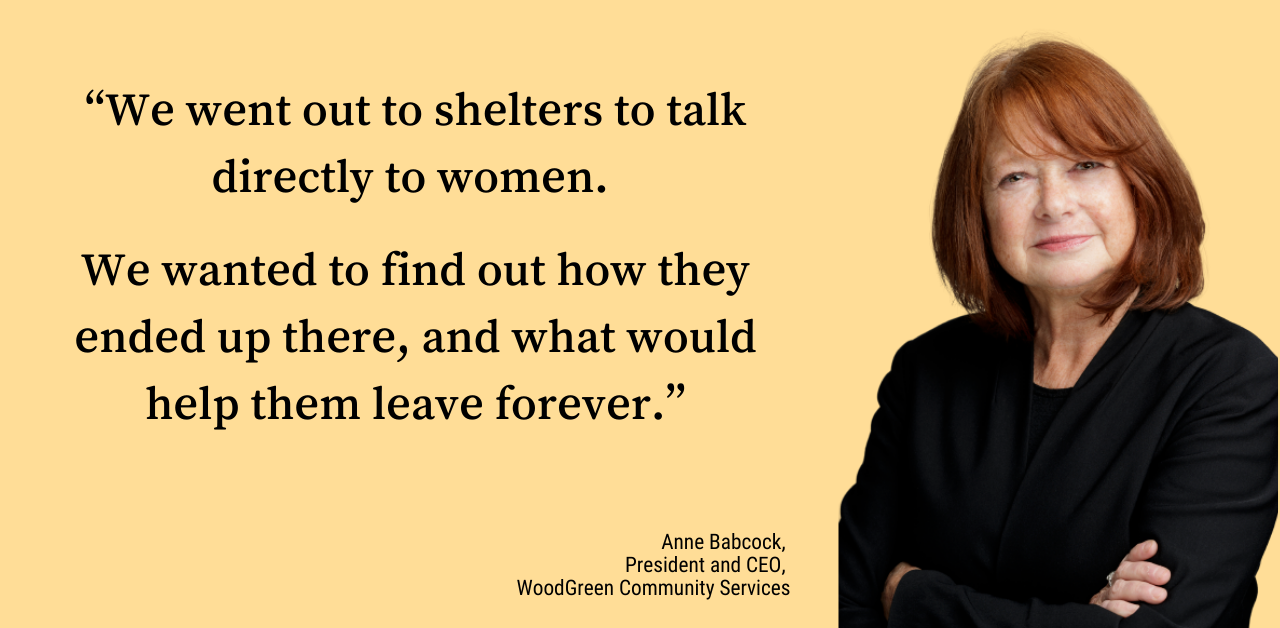
Homeward Bound Breaks a Vicious Cycle
Inspired by a program in Ireland, Babcock and her team designed a uniquely Canadian-grown program; Homeward Bound. The program would span four years, divided into four phases.
- Program Start:
Women complete life skills training, computer and financial literacy education, and academic upgrading to prepare for college. - Community College:
Women enrol in a fully funded two-year college diploma program. - Transitions to Success:
Focus on job readiness training, job search workshops with Industry Council members and receive housing search support. - Internship, Employment and Exit:
Women complete a paid 14-week internship and a job search to secure sustainable employment.
To support the women, Homeward Bound would provide housing, child care, counselling, tuition, laptops, transit passes, groceries and clothing.
“You need to address all of these things,” says Babcock,” to help jumpstart someone into the life they should have and give them opportunity to thrive like anybody else in the city of Toronto.”
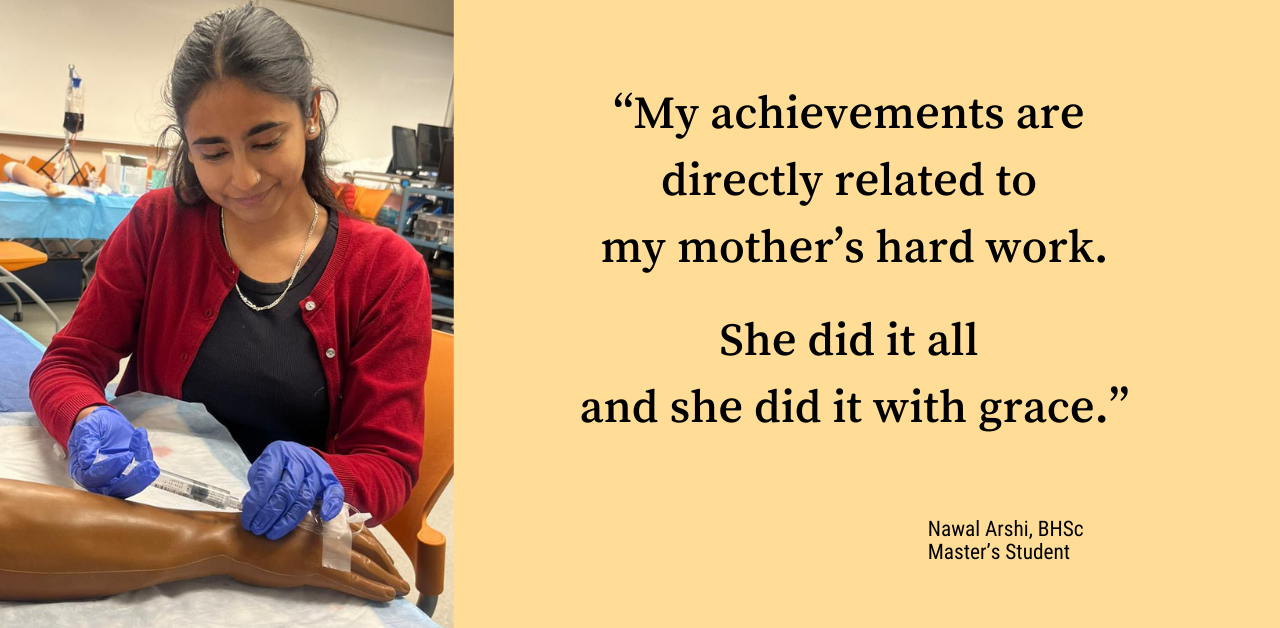
Overcoming Barriers to Innovation
Implementing such a program meant rewriting the book on housing in Toronto, including lobbying for changes to the Residential Tenancies Act to allow for transitional housing. Homeward Bound was groundbreaking. That’s why Babcock believed it would work.
“There were a lot of barriers to putting a program like this in place, but we went after them one by one,” says Babcock.
Homeward Bound had a clear plan for change but lacked the funds to make it happen. Babcock didn’t know it, but at the same time there was someone with the funds, searching for a meaningful way to tackle homelessness.
Funders Value Empowering Women
Ed Clark, former CEO of TD Bank, is renowned for his philanthropic efforts and his commitment to doing good things with his money in the city he loves.
“People always ask me why I give my money away,” says Clark, “But what toy could I possibly have that would compare to helping someone change their life forever?”
His first $1 million donation to WoodGreen marked the beginning of Homeward Bound as well as a decades-long relationship between the Clark family and WoodGreen Community Services. That donation was used to purchase an apartment building in Toronto’s East End that would provide stable, affordable housing for women and their children for four years.
But the goals of Homeward Bound extend far beyond that.
“For conscious reasons, we built the building in a place that wasn't a poor area,” recalls Clark. “It was an area where, when the women got jobs, it was an appropriate neighbourhood for them to live and raise their children.”

‘We Were Super Happy’ at Homeward Bound
Homeward Bound has since expanded to three Toronto locations, housing 99 women-led families. But it was the inhabitants of that first building in Toronto’s East end who formed Nawal’s family.
“If ever I walk by there, I remember it all,” says the now 25-year-old. “The lemonade stands we set up. The daycare and the multicultural celebrations we had.”
Each mother and her children had a two- or three-bedroom apartment and Nawal recalls the other children became like siblings, gathering in a common room to play and kicking balls up and down the hallways.
“I learned how to ride my bike in that parking lot. It was pink, purple and white and I loved it.”
The women took turns looking after one another’s children, and Nawal says it was the first time she had ever seen her mother have any friends.
“We were super happy.”
Homelessness Can Isolate Children
The children enrolled in local schools, but many struggled both socially and academically. Episodic homelessness meant they had been in and out of schools, often falling behind.
“Kids end up being isolated in the school system when they’re living in shelters,” says Babcock. Either they’ve made friends and then were forced to move again, or other children were reluctant to befriend them knowing that it was likely they’ll leave soon.”
🔷RELATED STORY🔷 New Study Shows Impact On Children of Homeward Bound Participants
Homeward Bound responded by providing tutors and after-school learning for the children. In addition to therapy and counselling for the women, family counsellors were available to help with parenting and social issues. The transition from being a “shelter kid” to one who could finally put down roots was significant, says Nawal.
“Homeward Bound let me just be a kid and feel more normal. I had a home to bring friends to. I got to go to camp or on field trips.”

Seeing What Hard Work Can Do
With a safe place to live, child care for her daughter and academic support, Nawal’s mother, Sajeda, enrolled at Seneca Polytechnic to become a business analyst. Rather than burdening the women with student loans, WoodGreen, with help from its donors, paid for their tuition so they would not graduate in debt.
All the while, Nawal watched her mother work hard, study diligently, and become more confident.
“My mom’s only goal was to do the program and do it right, for both of us. I’ve seen what hard work can do.”
That hard work led Sajeda across a stage four years later to receive her Diploma in Business Administration. Cheering loudest in the crowd was her then eight-year-old daughter. A few weeks later, both Nawal and Sajeda stood on stage with the very first Homeward Bound graduates.
Ed and Fran Clark, who have continuously helped fund Homeward Bound since its inception, were there.
“I go to every graduation, and I cry at every single one of them,” he says. “Homeward Bound restores their sense of self-worth and what you see is women with a well-earned sense of self dignity.”
Graduates: Qualified and Competitive
Graduation is not the end goal for Homeward Bound. It’s about ensuring sustainable change and stable futures. It’s why Babcock says WoodGreen assembled a key component that sets Homeward bound apart.
“The Industry Council is a group of HR professionals across the corporate sector in Toronto who are willing to step up and act as an internal network for the women; a network they would never otherwise have.”
The council includes members from banks, consulting groups, construction, health care, technology and retail, among others. The Industry Council supports Homeward Bound mothers by providing networking opportunities, helping them find jobs, and offering the skills to compete in the job market.
When Nawal and her mother moved out of the Homeward Bound building after four years, they stayed in the same area, as the program had intended. Sajeda Arshi secured a job at CIBC where, over the next 20 years, she built a career as a Senior Business Analyst working with Capital Markets and large corporate clients.
Homeward Bound has produced a long-lasting positive impact in the city of Toronto. In the last three years, 100 per cent of graduates are employed, earning between $60-$70,000 a year.
‘Still, Lots of Women in Shelters’
Despite the success of Homeward Bound, Babcock emphasizes that the need for the program remains.
“There are still lots of women in shelters,” says Babcock, “and there are lots of reasons women end up in shelters.”
Nearly half of the women entering Homeward Bound have already used homeless shelters, and more than half have faced domestic violence.
Babcock says those statistics aren’t unique to Toronto, nor is Homeward Bound’s success. She says the program stands out as a model for change and works in both large and small cities. In addition to its three Toronto buildings, Homeward Bound is currently delivered by agencies in Peterborough, Halton and Brantford-Brant. Word of its success is spreading. “There’s also a group in New Brunswick who would like us to help them steer the program,” says Babcock.
Scaling Up:
New Homeward Bound Pilot Program
Both she and Ed Clark say Homeward Bound is exactly the type of program governments should be funding and supporting. It’s why they brought forth a proposal to scale up Homeward Bound, getting more women through the program without the time-consuming and expensive process of securing real estate and building new housing.
“There are 9,000 single mothers on welfare in Toronto Community Housing,” says Clark. “What if we ran Homeward Bound for them while they stay in their apartments? We provide daycare, tutoring and send to college.”
🔷RELATED STORY🔷 Homeward Bound changes your life
Homeward Bound's success story begins a new chapter in 2025. WoodGreen is partnering with Toronto Community Housing on a three-year pilot program to support up to 25 single mothers on a proven path to stability and economic independence. As they graduate through the program, they will also free up space to give the same opportunities to other single women-led families in need.
Clark is certain the program with Toronto Community Housing will be a success and spark an expansion across the country.
“What’s happened with this program is that the future for these women and their kids is different than the future would have been otherwise.”
Hope for Generations to Come
Nawal couldn’t agree more. As a passionate advocate for Homeward Bound, she wants women to know there is hope in what can seem a hopeless situation.
“It’s okay to get help when you need it,” says Nawal. “I’ve seen what that help looks like and what it can do for you and your children.”
Nawal is proof of that. She says her childhood during and after Homeward Bound was stable and secure. She’s still friends with the kids she played ball within the hallways of Homeward Bound and sees most of them as family. Nawal went on to Western University, excelling in student government, earning a Bachelor’s degree in Health Sciences.
She is now pursuing a Master’s degree in Physician Assistant Studies. She aims to work in public medicine, serving marginalized communities like those facing homelessness in Toronto.
When asked where she draws her drive and confidence, she doesn’t hesitate
“My mum is my best friend,” she says.
“I have so much respect for her and what she did for us. I truly believe I can do anything because I’ve seen my mum go through so much and succeed.”
🟦 Help us support more women through Homeward Bound.

